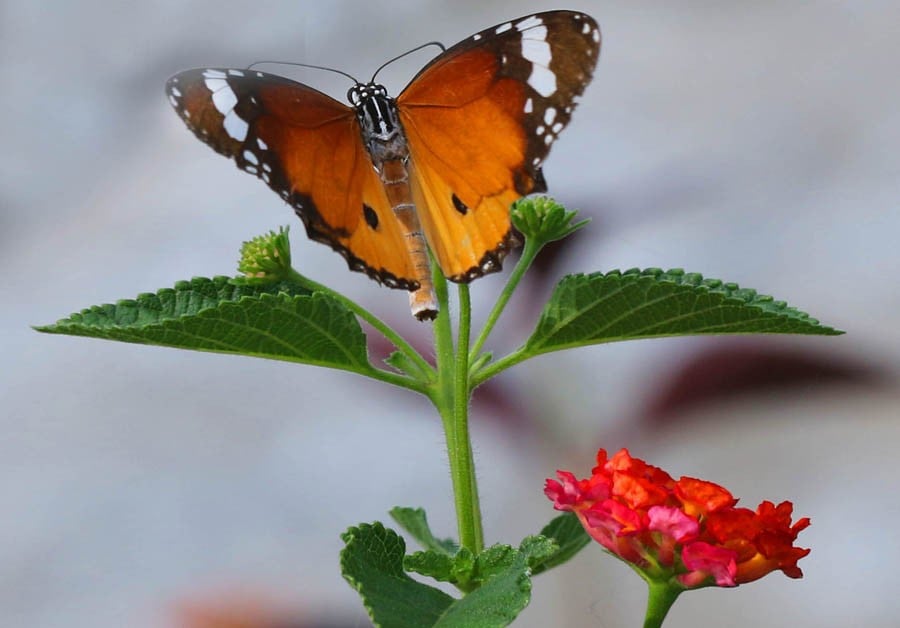
Decline in habitat quality coupled with excessive pesticides use has led to a dangerous decrease in the population of butterflies that are pollinators, next only to the bees

Butterflies speak volumes of the magnificence of natural diversity. Today, you are lucky if you spot a butterfly gliding and flitting back and forth over the flowers in your garden.
The butterfly imagery is ubiquitous in varied forms of art, be it a painting or a piece of designed cloth. With their myriad colours and intricately woven patterns, these are the most beautiful insects you can find. In school, our first exposure to a lifecycle is that of a butterfly. All of us have studied the four stages of a butterfly’s evolution -- egg, larva, pupa and adult -- at school. Butterflies have complete metamorphosis and this has fascinated the researchers no end.
Chasing the beautiful butterflies might only remain a fond memory you’re your childhood, as this exotic specie is now becoming extinct.
"Where have all the butterflies gone?" asks Taufiq Pasha Mooraj, an activist and horticulturalist. "You need to ask yourself where have all those flowers gone that once grew in your backyard. Let’s hold the responsibility too."
The flowers play ‘host’ to the butterflies, as they are the only source of food for them, perhaps also a place to lay their eggs and assist in other life functions. "If there are no flowers, citrus fruit trees and other species of plants, there would be no larva striving to morph into the beautiful butterfly. They need the plant nectar," Mooraj says.
"Urban sprawl and continuing industrial development are major factors influencing the decline in quality flower and rich grasslands."
He also comes down hard on the government that "always fails to address the issue of environmental degradation while planning expansion of the city. The agony of air pollution and decline in habitat quality, specifically floral composition in addition to selection of the right type of trees -- everything is overlooked."
Butterflies are the best monitored group across the world to determine portending shifts in the eco-systems due to global warming. As the world is warming, these can’t seem to cope with the rising temperatures in plains. "This group of insects is highly sensitive to temperature variations. So far, 14 out of 60 butterfly species have become extinct from different areas of Punjab," reveals Dr Abdul Rauf Shakoori, Director of Zoological Society of Pakistan.
Not many researches have been carried out in the country to ascertain the impact of the disturbed eco-system. "It is apathetic that we have still not awoken from our slumber. A few students wanted to voice their concern about losing butterflies. It’s the topic of their thesis which has been published. We may soon be facing a big threat of lower agriculture productivity."
On the other hand, an official at the Pakistan Agriculture Research Council says there is no any factual data available to analyse the situation, because it is believed that the decreasing number of butterflies could not pose a big threat to the pollination of plants. But he agrees with the notion that there is a shift in the population of butterflies towards the north as these areas are not as cold as they were in previous years, and secondly, because these areas still have a lot of greenery, vegetation, flowers, and trees compared to urban centres.
"More than 90 per cent of all plants need a pollinator to set fruit and seeds. Bees are the better known pollinators but butterflies also have a role to play as an important pollinator which helps in agriculture productivity especially in the case of herbs and fruit trees," says Shakoori adding, "small changes can have large effects."
Use of chemicals on farms also attributes to poisoning the air for the butterflies and other beneficial organism. "There is no need to use powerful poisons to protect your garden. Let the butterflies lay eggs on the plant; you need to know during the metamorphosis some of the leaves will be damaged by the caterpillars," Pasha explains, warning "you should not follow the instructions of the illiterate gardeners. His immediate reaction would be to spray the leaves with insecticide. What happens next is the death of the caterpillar that sooner would have transformed into a beautiful butterfly."
With climate change, the longer span of the summer season has increased the number of predators like wild lizards and black crow which prey on butterflies. "You cannot only blame the government, you should see what you can do in your personal garden to allow the return of the butterflies," Pasha suggested, "Go organic, use less pesticide and plant flowers."